Phenotypic Personalized Medicine
Abstract
Patient response rates to chemotherapy are fairly low in cancer treatment, often due to human diversity and cancer heterogeneity. For example, the response rate for lung cancer is about 25% and only 10% for hepatoma. Therefore, personalized medicine is necessary to improve treatment efficacy/response rate as well as safety by providing precisely tailored patient therapy.
Cancer and infectious disease therapy often use combinatorial medicine, where multiple compounds that address different pathways may improve treatment outcomes. Conventional multi-drug regimens are often additively determined. In addition, the maximum tolerated doses (MTD) of each drug for ensuring cancer-killing efficiency is usually used as a reference in the combinatorial regimen. Toxicity, hence, becomes a challenge in developing drug combinations. Current methods are far from optimal. Rational combinatorial design must move beyond arbitrary dosing practice.
To address the need for the systematic optimization of personalized treatment for a broad spectrum of physiological disorders, the speaker and his collaborators have developed a paradigm shift concept that they have termed Feedback System Control (FSC). FSC is an experimental/analysis platform that efficiently calibrates the adaptability of patient physiology towards therapeutic stimuli. Based on an experimental landscape of patient-specific phenotypic mapping, optimal drug-dose combinations can be identified from an almost infinitely large parameter space. FSC can subsequently provide unprecedented control and actionable insight into the dynamic nature of the patient body to enable directed phenotypic outcomes for transformative applications in Phenotypic Personalized Medicine (PPM). FSC based PPM is mechanism-independent and indication-agonistic. PPM platform has been successfully applied to more than 20 indications including organ transplants, cancers and infectious diseases.
About the speaker
Prof. Ho Chih-Ming received his PhD from the Johns Hopkins University and holds the Ben Rich-Lockheed Martin Chair Professor and Distinguished Professor in the UCLA School of Engineering. He served as the UCLA Associate Vice Chancellor for Research from 2001-2005.
In 1997, Prof. Ho was inducted as a member of the US National Academy of Engineering. In 1998, he was elected as an Academician of Academia Sinica. He is also a Fellow of the American Physical Society, American Institute of Aeronautics and Astronautics as well as American Institute for Medical and Biological Engineering. Prof. Ho holds nine honorary chair professorships including the Einstein Professorship from the Chinese Academy of Sciences. He has delivered 18 named distinguished lectures and presented over 130 keynote talks in international conferences. He is ranked by ISI as one of the top 250 most cited researchers worldwide in the entire engineering category. He was awarded a Doctor of Engineering honoris causa from the Hong Kong University of Science and Technology in 2014.




